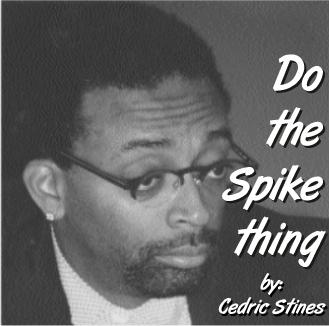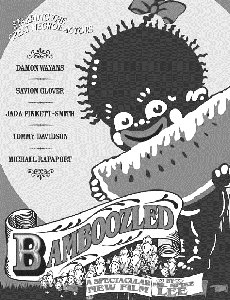
“I don’t think anger is that bad,” says Spike Lee. And if anyone has earned a reputation of being angry, it’s the soft-spoken writer-director-producer-actor.
But is the man angry or just his films? Or is it just his combination of thoughtfulness and lack of fear of expressing himself that ends up being misconstrued as “angry”? Regardless, everyone has an opinion about Lee.
If anything, this guy should be about as happy as one can get. His August film “The Original Kings of Comedy” has made $35,524,631 to date, and his new film, “Bamboozled,” is set to hit theaters Oct. 6. And if you didn’t have an opinion of Lee before, you will after this film.
In the midst of whatever controversy he may cause and the inevitable racial discourse that accompanies each of his films-whether directly or indirectly-Lee always finds time to wax poetic on the things most important to him, like the recent four-team deal that sent longtime New York Knicks center Patrick Ewing to Seattle. “It’s a sad day in New York,” Lee says. “A sad day.”
“Bamboozled” stars Damon Wayans of “In Living Color” fame as Pierre Delacroix, the lone African-American writer at a fledgling TV network. When he realizes that he needs to come up with a hit, like, yesterday, Pierre pitches a show-a remake of blackface minstrel shows-that he believes people will hate, but instead they love it-much to Pierre’s chagrin.
Savion Glover co-stars as the star of “Mantan: The New Millennium Minstrel Show.” Lee became a fan of Glover when he saw the dancer-choreographer in the Broadway production of “Bring In Da Noize, Bring In Da Funk” several years ago. “Anyone who can dance like that can express themselves; and if you can express yourself like that, you can act,” Lee says. (Glover is currently in Chicago, starring in “Footnotes” at the Shubert Theatre through Oct. 15.)
The film also marks a new direction for Lee because it is his first all-digital production. “We shot on the Sony VX 1000. It’s small and you just shoot.” But he does recognize the format’s limitations: “Of course, video doesn’t look like, doesn’t have the same resolution, film does. But with the budget we had and the amount of material that we shoot, this was the way to go.” For some scenes, Lee had up to 15 cameras rolling at the same time.
Lee wrote the film because he firmly believes that some TV shows geared towards African-American audiences confirm the theory Delacroix posits early on in the film: People only want to see African-Americans on TV as buffoons. He also believes that African-American culture on TV represents only “some aspects” of real-life African-American culture.
 |
| The controversial ad campaign for Spike Lee’s “Bamboozled,” which includes the above poster, has already come under fire from several critical circles for its blatant racial tone. |
As the film progresses, Delacroix’s office becomes increasingly filled with blackface-style memorabilia, and most of these items came from Lee’s personal collection. “I started [collecting these items] when I decided to do the script because I felt I needed to surround myself with these items. While I was writing the script, to my left I had my Aunt Jemima cookie jar, and on the right I had my “Jolly N-----” bank filled up with quarters. [This last item plays a prominent role in the movie.] I mean, all that stuff [pictured] in the ending credits-none of that stuff is made up. That stuff’s all authentic. And it shows the depths to which those twisted minds thought of black people-we were subhuman.”
Lee says this is a movie that “puts the audience members in that position where you want to laugh but you know you shouldn’t because it isn’t politically correct.” Especially scenes in which Glover and co-star Tommy Davidson (also of “In Living Color” fame) put on their burnt-cork blackface for the first time. “It was very painful [for them]. Painful because you’re dehumanizing yourself. It takes a lot out of you, too.”
And to anyone who might find the film’s premise a little too far-fetched: “Did you ever see ‘The Secret Diary of Desmond Pfeiffer?’ Did you ever see ‘Homeboys In Outer Space?’ [Both are short-lived UPN sitcoms]. These shows get on television. Let me give you the premise: ‘Let’s do a sitcom about slavery.’ That’s not funny to me, but that guy over there [thinks it is]. ‘Let’s do a sitcom about some homeboys and they’re in outer space. And they’ve got a computer with a voice’-her name’s Laquesha or LaQuanya or whatever that is. If someone told me that, I’d say, ‘No way that’s getting on the air.’ They made it. So … for me I don’t think there’s anything in this film that’s far-fetched, that could not happen.”
Lee believes that ultimately, all performers-black and white-are faced with certain choices. “If, say, you’re a woman and a singer or a rapper, and in order to sell a record, the record company says, ‘Look, here’s the way we want to market you, to promote you: You’ve gotta show your a--, you gotta show your breasts.’ That’s a choice you have to make. Lil’ Kim made that choice; she’s going to show her a-- to sell records.”
But to Lee this choice also extends to everybody else: “No matter what you do, somewhere down the line-you’re in college [so you don’t have to worry about this yet]-you might be asked to do something that might compromise your values, your morals, to advance your career. So, what are you going to do? Make that choice.”
Lee has definitely made his choices and has always done things his way. So why do so many people think he is inherently angry? Is this an unfair characterization of this man? “Very much so. [Anger’s OK] if you’re talking about anger that makes you move, makes you want to do something-by do something I don’t mean burn s--- down or start shooting people, but just makes you want to do something constructive, to change the situation that you see. And there’s this really backwards thinking that if you become successful, you have money and all that other stuff, you should just shut the f--- up and kick it-chill. I’m not made up that way.”
So, how does Lee deal with criticism? “It really depends who it is and what they’re saying. You need to realize that when you’re an artist, you put yourself out there. This just comes with the territory. So how can I be upset-I get on people, too.”
Of his craft, Lee doesn’t feel a necessity to make socially conscious films, nor does he necessarily set out to make them. “I do make different things,” Lee says. “’The Original Kings of Comedy’-that was a very funny film. I tell different stories, I take different approaches, I have different goals with each film.” But Lee makes it clear that if he made a movie that elicited no reaction, “That’s when I have to hang it up.”
In film school Lee’s heroes included multifaceted artists like Melvin Van Peebles, Ossie Davis, Gordon Parks, Martin Scorsese, Akira Kurosawa, Federico Fellini and Elia Kazan. Not only do these directors influence Lee’s work as a whole, Lee can also point to specific films influencing “Bamboozled.” “The film with the most influence on this film was a film called “A Face In the Crowd,” and if you haven’t seen it you should rent it. It’s directed by Elia Kazan and written by Budd Schulberg. It’s the film that influenced Paddy Chayefsky to write “Network” [another film Lee credits heavily as a direct influence on “Bamboozled”]. It really is a great film; it talks about the power of television. You should go out and rent it. It stars Andy Griffith-pre-Mayberry.”
“Bamboozled’s” dark, satirical worldview also finds its roots in film’s past. “ … There is no law written that satire can’t include tragedy. If you’ve seen ‘Network,’ how did that end? Howard Beale goes down in a blaze of bullets. How does ‘Dr. Strangelove’ end? With Slim Pickens riding-Yee-ha!-the bomb which, in turn, brings about the end of civilization. So you can’t say that if it’s a satire, that means it can’t be dark or violent. Here’s another example: ‘A Clockwork Orange.’ Right? That’s one of the greatest uses of satire to me, somebody getting the s--- kicked out of them while the guy’s singing ‘Singin’ In the Rain.’”
Though Lee is a film buff, he doesn’t spend all of his time in the screening room. “I spend more time watching sports,” he says. “But I like films. Somebody like Martin Scorcese, that’s all he does-movies, nothing else.”
Sports and movies have always been intertwined in Lee’s life-Lee knows Michael Rapaport, who plays Pierre’s boss, from Knicks games-so Lee has no problem working both into his stories, such as this quickie about the Ewing trade: “I was at the press conference yesterday and someone asked me, ‘Spike, in one word can you describe this Knicks trade.’ I said, ‘Bamboozled.’ We got hoodwinked.”
Contributing: Jim Distasio